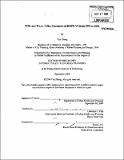Wills and ways : policy dynamics of HOPE IV from 1992-2002
Author(s)
Zhang, Yan, 1972-
DownloadFull printable version (14.74Mb)
Other Contributors
Massachusetts Institute of Technology. Dept. of Urban Studies and Planning.
Advisor
Lawrence J. Vale.
Terms of use
Metadata
Show full item recordAbstract
(cont.) thorough analysis of the stability and change of HOPE VI policy offers insights into the potentials and the pitfalls of this major public housing program and similar federal policies in the American political system. I will suggest strategic ways to deploy political advocacy and to facilitate genuine policy learning in the domain of housing and urban development in general. Qualitative in approach, this study relies on extensive document reviews and in-depth interviews with key policymakers and practitioners involved in the program. Congress created what became known as the HOPE VI (Homeownership and Opportunity for People Everywhere) program in 1992 to revitalize severely distressed public housing developments. To date, HOPE VI has constituted the primary vehicle and the most strenuous governmental effort ever undertaken to salvage public housing in America. Over the past decade, after several transformations in its goals and foci, the program evolved from a modest attempt to remedy the ills of troubled projects into an ambitious plan to reinvent the public housing system by engaging the Department of Housing and Urban Development (HUD) and Public Housing Authorities (PHAs) in a new way of doing business. This dissertation aims to develop a historically aware and empirically sound account of how and why HOPE VI policy evolved when it did. Recognizing the ambiguity and serendipity in the policymaking process, I apply and extend John Kingdon's "Multiple Streams" theory to the federal rule-making process of a particular agency, HUD. By positioning the politics of the public housing program within a temporal and institutional context, I show how transformations in HOPE VI occurred as a result of the convergence of re-articulated policy problems, the availability of policy alternatives, and the ebbs and flows of the political climate. In particular, I highlight how policy entrepreneurs inside and outside the government (at both the federal and local levels), working within internal and external insitutitional constraints, captured and created windows of opportunity for policy change. HOPE VI brought to light again the federal role in low-income housing delivery and contributed significantly to a landmark piece of legislation--the Public Housing Reform Act of 1998. A
Description
Thesis (Ph. D.)--Massachusetts Institute of Technology, Dept. of Urban Studies and Planning, 2004. Includes bibliographical references (p. 207-216).
Date issued
2004Department
Massachusetts Institute of Technology. Department of Urban Studies and PlanningPublisher
Massachusetts Institute of Technology
Keywords
Urban Studies and Planning.